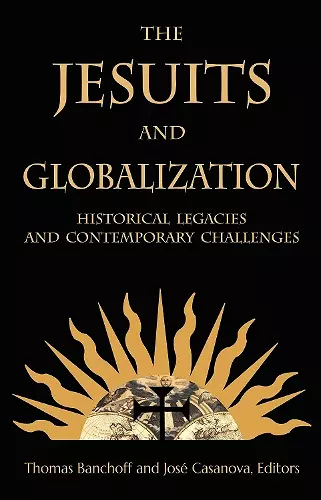The Jesuits and Globalization
Historical Legacies and Contemporary Challenges
José Casanova editor Thomas Banchoff editor
Format:Hardback
Publisher:Georgetown University Press
Published:25th May '16
Currently unavailable, and unfortunately no date known when it will be back
This hardback is available in another edition too:
- Paperback£28.00(9781626162860)

Examining the world-history of the Society of Jesus from its foundation in 1540 across three phases of globalization, The Jesuits and Globalization documents how Jesuit missions and education contributed to the rise of humanitarianism, cosmopolitanism, and the rise of human rights regimes. -- Bryan S. Turner, The Graduate Center CUNY and ACU (Melbourne) This interesting collection describes the remarkable historical trajectory of the Jesuit order-how already in the sixteenth century they anticipated some of the insights we have only recently acquired about how to live in a globalized world. We understand, too, how this order has so often inspired at once great admiration and implacable hostility. The book offers a new perspective on the unfolding of world history over the last half-millennium. -- Charles Taylor, Professor Emeritus of Philosophy, McGill University
The Society of Jesus, commonly known as the Jesuits was founded by Ignatius Loyola in 1540. This book explores what we can learn from the historical and contemporary experience of the Society of Jesus - what do the Jesuits tell us about globalization and what can globalization tell us about the Jesuits?The Society of Jesus, commonly known as the Jesuits, is the most successful and enduring global missionary enterprise in history. Founded by Ignatius Loyola in 1540, the Jesuit order has preached the Gospel, managed a vast educational network, and shaped the Catholic Church, society, and politics in all corners of the earth. Rather than offering a a global history of the Jesuits or a linear narrative of globalization, Thomas Banchoff and Jose Casanova have assembled a multidisciplinary group of leading experts to explore what we can learn from the historical and contemporary experience of the Society of Jesus -- what do the Jesuits tell us about globalization and what can globalization tell us about the Jesuits? Contributors include comparative theologian Francis X. Clooney, SJ, historian John W. O'Malley, SJ, Brazilian theologian Maria Clara Lucchetti Bingemer, and ethicist David Hollenbach, SJ. They focus on three critical themes -- global mission, education, and justice -- to examine the historical legacies and contemporary challenges. Their insights contribute to a more critical and reflexive understanding of both the Jesuits' history and of our contemporary human global condition.
This superb collection of essays is strongly recommended to anyone interested in the history and distinctive identity of the Society of Jesus evolving out of Renaissance humanism. It also provides a timely caution for anyone interested in globalisation, especially in light of what Pankaj Mishra has recently called the ‘Globalization of Rage’. Nationalist populism evokes the initial quandary of negotiating self-identity stated in this collection’s introduction. * The Way *
Multi-themed yet coherent and articulate. * Journal of World History *
This volume of essays could not be more timely for a political moment. . . . An impressively researched catalogue . . . [that] succeeds best as a compelling defense of this new, radical (if historically rooted) Jesuit leadership in global engagement. * Catholic Historical Review *
An ambitious project which has considerable success in the quality of the articles in contains, and the arguments it sustains. * Journal of the American Academy of Religion *
In this erudite collection, the authors claim that the Jesuits more than anyone contributed to global connectivity and became cultural and political players across the world. * Independent Catholic News *
ISBN: 9781626162877
Dimensions: unknown
Weight: 454g
304 pages